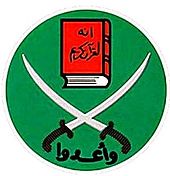History of the Muslim Brotherhood in Syria
|
Muslim Brotherhood of Syria
الإخوان المسلمون في سوريا |
|
|---|---|
 |
|
| Leader | Mohammad Riad al-Shaqfeh |
| Deputy | Mohammad Farouk Tayfour |
| Head of the Shura Council | Mohammad Hatem al-Tabshi |
| Founder | Mustafa Sibai |
| Founded | 1945 |
| Ideology | Sunni Islamism |
| International affiliation | Muslim Brotherhood |
| Party flag | |
 |
|
| Website | |
| http://www.ikhwansyria.com | |
The Muslim Brotherhood of Syria (Arabic: الإخوان المسلمون في سوريا Al-Ikhwan Al-Muslimun fi Suriya), formerly the Islamic Socialist Front, has been described as "a branch" of the Sunni Islamist Muslim Brotherhood, and as "very loosely affiliated" to the Egyptian Muslim Brotherhood. In its most recent April 2012 manifesto it "pledges to respect individual rights", to promote pluralism and democracy, and does not even "mention the word Islam".
Founded at the end of World War II, the Muslim Brotherhood of Syria was seen as one of several important political parties in the 1950s. When Syria unified with Egypt to form the United Arab Republic, the disbanding of the Muslim Brotherhood as a political party was a condition of union, one complicated by Gamal Abdel Nasser's conflict in Egypt with the Egyptian Muslim Brotherhood. The Syrian Muslim Brotherhood was banned by the government of the Syrian Arab Republic starting after the 1963 coup by the secularist, pan-Arabist Ba'ath Party. The Muslim Brotherhood played a major role in dissent against the secular Ba'ath Party during the period 1976-1982, and membership in the Brotherhood in Syria became a capital offence in 1980.
Following the Hama uprising of 1982 in the wake of the wider Islamist insurgency in Syria (1979–1982), when thousands of armed insurgents and civilians were killed by the military the Brotherhood was effectively broken as an active political force inside Syria.
The Muslim Brotherhood in exile was among the 250 signatories of the Damascus Declaration of 2005, a statement of unity by Syrian opposition including the Arab nationalist National Democratic Rally, the Kurdish Democratic Alliance, the Committees of Civil Society, the Kurdish Democratic Front, and the Movement of the Future, and calling for "peaceful, gradual," reform "founded on accord, and based on dialogue and recognition of the other. "
...
Wikipedia
